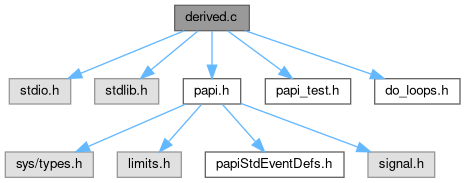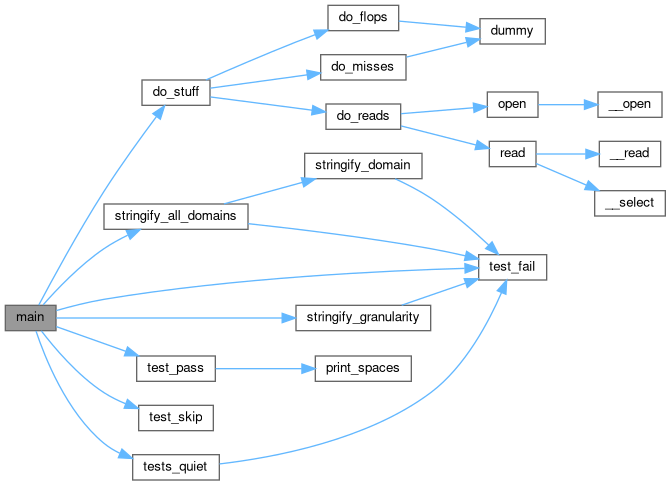Loading...
Searching...
No Matches
Include dependency graph for derived.c:

Go to the source code of this file.
Macros | |
| #define | EVENTSLEN 2 |
Functions | |
| int | main (int argc, char **argv) |
Variables | |
| unsigned int | PAPI_events [EVENTSLEN] = { 0, 0 } |
| static const int | PAPI_events_len = 1 |
Macro Definition Documentation
◆ EVENTSLEN
Function Documentation
◆ main()
Definition at line 17 of file derived.c.
18{
22 PAPI_event_info_t info;
26
27 /* Set TESTS_QUIET variable */
29
33 }
34
36 printf( "Test case %s: start, stop with a derived counter.\n",
37 __FILE__ );
38 printf( "------------------------------------------------\n" );
45 }
46
48 do {
52 break;
53 }
54 }
56
59 }
60
64 }
65
70 }
74 }
75 }
76
80 }
81
83
84 do_stuff( );
85
89 }
90
92
95 printf( "------------------------------------------------\n" );
96 }
97
101 }
102
106 }
107
109
112 printf( "Yes: " );
114 printf( "\n" );
115 }
116 }
117 else {
119 }
120
121 test_pass(__FILE__);
122
123 return 0;
124}
add PAPI preset or native hardware event to an event set
Empty and destroy an EventSet.
Create a new empty PAPI EventSet.
Empty and destroy an EventSet.
Enumerate PAPI preset or native events.
Convert a numeric hardware event code to a name.
Get the event's name and description info.
Get PAPI library or event set options.
initialize the PAPI library.
Start counting hardware events in an event set.
Stop counting hardware events in an event set.
void PAPI_NORETURN test_fail(const char *file, int line, const char *call, int retval)
Definition: test_utils.c:491
void PAPI_NORETURN test_skip(const char *file, int line, const char *call, int retval)
Definition: test_utils.c:584
Definition: papi.h:957
Here is the call graph for this function:
